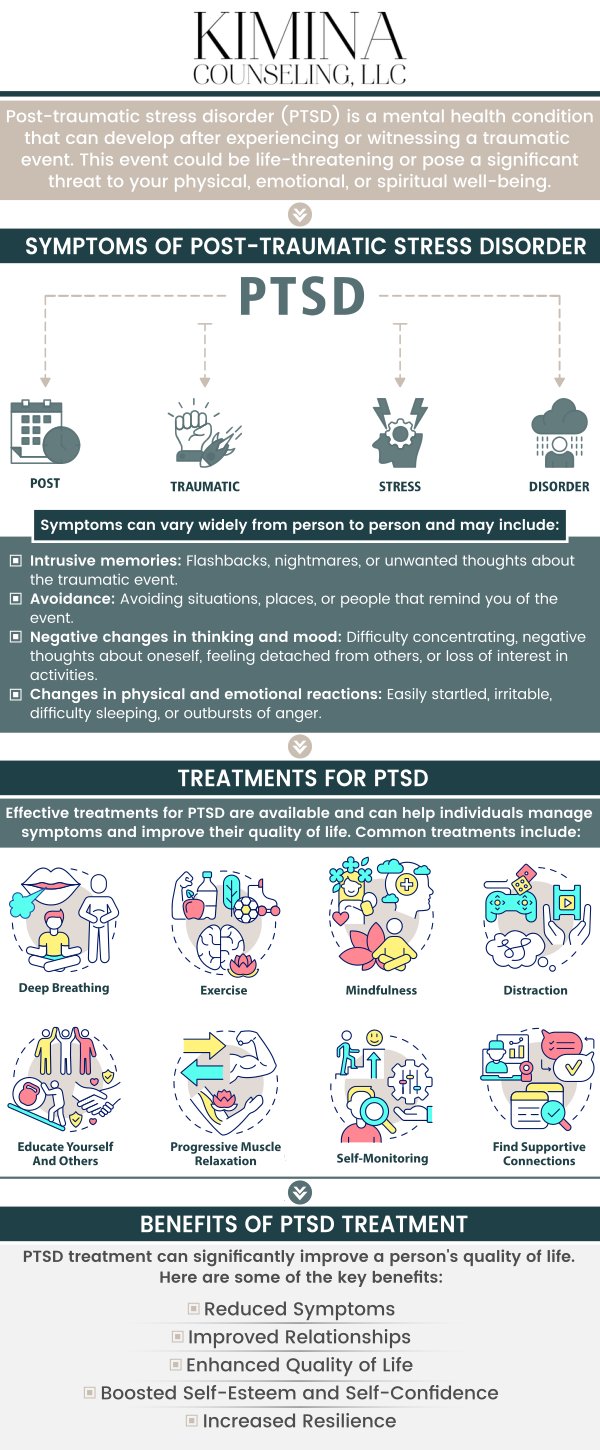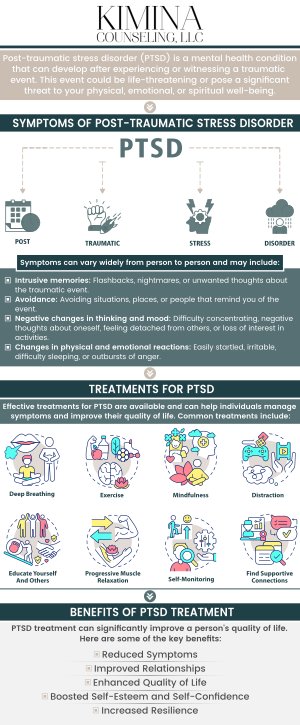PTSD Symptoms: When to Seek Help
Recognizing PTSD symptoms early is crucial for effective treatment. If you’re experiencing intrusive memories, emotional numbness, or physical symptoms like sleep disturbances, it may be time to seek help. Kimberly Sanchez, LMHC, and Amina Mazzara, LMHC, at Kimina Counseling, LLC, offer compassionate, trauma-informed care to support your healing journey. For more information, contact us or schedule an appointment online. We are conveniently located at 7 Midstate Drive, Suite 202, Auburn, MA 01501.


Table of Contents:
What are the main signs or symptoms of PTSD?
How long do PTSD symptoms last?
Can PTSD symptoms appear long after the traumatic event?
What are common PTSD triggers?
Why does PTSD have physical effects?
Why Do Patients Trust Kimberly Sanchez, LMHC & Amina Mazzara, LMHC, at Kimina Counseling, LLC, for PTSD Symptom Support in Auburn, MA?
Post-Traumatic Stress Disorder (PTSD) is a mental health condition that can develop after experiencing or witnessing a traumatic event. It often causes significant disruption in a person’s life, affecting their emotional, mental, and physical well-being. At Kimina Counseling, LLC, Kimberly Sanchez, LMHC, and Amina Mazzara, LMHC, are dedicated to providing compassionate, trauma-informed care for individuals struggling with PTSD. They understand that symptoms can vary from person to person and are committed to creating a safe, supportive space where clients can explore their challenges and work towards healing.
PTSD symptoms often fall into several categories, which include:
• Intrusive Memories: Unwanted distressing thoughts, vivid flashbacks, or nightmares related to the traumatic event. These memories may feel so real that it seems as though the event is happening again, which can be emotionally overwhelming.
• Avoidance: Efforts to stay away from places, people, or activities that serve as reminders of the trauma. This can include avoiding conversations, situations, or even memories related to the traumatic event in an attempt to protect oneself from feeling distressed.
• Negative Changes in Thinking and Mood: PTSD often brings about negative shifts in mood and thought patterns. This can include feelings of hopelessness, detachment from friends or family, or difficulty recalling aspects of the traumatic event. Individuals may also develop a sense of emotional numbness or lose interest in things they once found enjoyable.
• Persistent Negative Emotions: Feelings of fear, guilt, shame, or a sense of being emotionally “stuck” are common. These emotions can lead to difficulty in relationships, difficulty experiencing positive emotions, or persistent feelings of worthlessness.
• Hyperarousal Symptoms: Individuals with PTSD may experience hyperarousal symptoms such as being easily startled, feeling on edge, and having sleep disturbances. Sleep problems can include trouble falling asleep or staying asleep due to anxiety or vivid nightmares. Difficulty concentrating and irritability may also arise, making it hard to focus on daily tasks or engage in regular activities.
• Reckless Behaviors: People with PTSD may engage in reckless behaviors, such as substance abuse, risky driving, or self-destructive actions, as a means of coping with intense emotions or numbing pain.
• Physical Reactions: PTSD can affect your physical responses to stress. This can include rapid heart rate, headaches, muscle tension, dizziness, or gastrointestinal issues, which may arise during moments of anxiety or distress related to reminders of the trauma.
Kimberly Sanchez, LMHC, and Amina Mazzara, LMHC at Kimina Counseling, LLC, recognize the profound impact that PTSD can have on an individual’s life. Their therapeutic approaches, grounded in trauma-informed care, are designed to help clients explore the underlying causes of their symptoms and work toward healing in a supportive, non-judgmental space. If you have been experiencing these symptoms for more than a month and they are interfering with your daily life, their expertise and personalized care can help you regain emotional balance and find peace.
At Kimina Counseling, LLC, we understand that the duration and intensity of post-traumatic stress disorder (PTSD) symptoms can vary greatly from person to person. Some clients may notice improvement within a few months, while others might experience symptoms for years or even a lifetime. According to the Diagnostic and Statistical Manual of Mental Disorders (DSM-5), PTSD is diagnosed when symptoms persist for at least one month after a traumatic event. These symptoms may include intrusive memories, avoidance behaviors, negative changes in mood and thinking, and heightened arousal.
Our therapists at Kimina Counseling, LLC, provide compassionate, evidence-based care tailored to each individual’s unique healing journey. While some people may find their symptoms gradually decrease with therapy or medication, it’s common for symptoms to fluctuate over time and intensify in response to certain triggers or periods of stress. Chronic PTSD is defined as symptoms lasting longer than three months, and even after significant improvement, some individuals may continue to experience mild or occasional distress.
We believe that early intervention and consistent support can make a meaningful difference in the recovery process. At Kimina Counseling, LLC, we are here to walk alongside you, recognizing that healing from trauma is highly individual and that there is no set timeline for recovery. Our goal is to provide you with the tools and support you need to regain a sense of safety, control, and well-being.
At Kimina Counseling, LLC, we understand that symptoms of post-traumatic stress disorder (PTSD) can sometimes appear long after a traumatic event has occurred. PTSD doesn’t always develop immediately—some people may not notice significant symptoms until months or even years later. This delayed onset can happen for many reasons, such as initially coping well or having strong support, which can temporarily buffer the impact of trauma. However, life changes, new stressors, or reminders of the trauma can bring symptoms to the surface unexpectedly.
Common PTSD symptoms include intrusive memories, nightmares, increased anxiety, avoiding reminders of the trauma, and changes in mood or thinking. If you or someone you care about is noticing these signs—regardless of how much time has passed since the traumatic event—know that you are not alone and help is available.
We provide compassionate, evidence-based care for PTSD at any stage. Whether symptoms are new or have been present for years, our team is here to support you on your journey toward healing. Reach out today to learn how we can help you move forward.
Common PTSD triggers can vary from person to person, but here are some of the most common ones:
• Anniversaries of the Traumatic Event: Dates or times that remind the person of the traumatic experience.
• Certain Locations: Places that resemble the environment where the trauma occurred or are associated with the traumatic event.
• Loud Noises: Sudden loud sounds, such as fireworks, sirens, or alarms, that can trigger flashbacks or feelings of danger.
• Images or Media: News stories, movies, or photographs that depict scenes similar to the trauma or bring up distressing memories.
• People or Faces: Encountering individuals who resemble the person or people involved in the traumatic event, or even people who were present during the trauma.
• Smells: Specific scents that remind the person of the traumatic event, like certain foods, perfumes, or smoke.
• Certain Words or Phrases: Hearing certain words or phrases that are associated with the trauma can trigger emotional or physical responses.
• Physical Sensations: Sensations like a certain touch, feeling trapped, or physical pain that remind the person of the trauma.
• Annoying Situations: Feeling helpless, trapped, or overwhelmed in situations that echo feelings felt during the trauma.
• Changes in Routine: Disruptions in daily routine or unexpected changes can provoke feelings of anxiety or stress, triggering PTSD symptoms.
• Intimate Relationships: Physical or emotional intimacy can sometimes remind individuals of trauma, leading to anxiety or discomfort.
Recognizing these triggers is a key part of managing PTSD symptoms, and individuals often work with a therapist to learn coping strategies to minimize their impact.
At Kimina Counseling, LLC, we understand that Post-Traumatic Stress Disorder (PTSD) affects more than just your thoughts and emotions—it can have a significant impact on your physical health as well. Trauma triggers the body’s natural “fight-or-flight” response, releasing stress hormones like adrenaline and cortisol to prepare for danger. However, for individuals living with PTSD, this heightened state of alertness can persist long after the traumatic event has passed. The nervous system remains overly sensitive, and continuous surges of stress hormones can lead to physical symptoms such as increased heart rate, high blood pressure, muscle tension, headaches, stomach problems, and sleep disturbances.
We recognize the close connection between the brain and the body, understanding that chronic stress and anxiety from trauma can impact various systems, including the immune, digestive, cardiovascular, and endocrine systems. Many people with PTSD experience chronic pain, fatigue, and a weakened immune response, making them more vulnerable to other health issues. Over time, ongoing stress may contribute to more serious health concerns, such as heart disease or metabolic disorders. At Kimina Counseling, LLC, we take a holistic approach to care by addressing both the mental and physical aspects of PTSD, helping individuals regain balance and improve overall well-being. If you or someone you care about is struggling with PTSD, we are here to provide compassionate, trauma-informed support throughout the healing journey.
Patients trust Kimberly Sanchez, LMHC, and Amina Mazzara, LMHC, at Kimina Counseling, LLC, for PTSD symptom support in Auburn, MA, because of their compassionate, trauma-informed approach and extensive experience in treating individuals with PTSD. Kimberly Sanchez specializes in using evidence-based therapies like EMDR and Cognitive Behavioral Therapy (CBT), helping patients process traumatic experiences and develop healthier coping strategies. Her strength-based approach focuses on creating a safe, non-judgmental space where individuals can explore their trauma, understand its impact, and work toward recovery. Kimberly’s empathetic and professional care has made her a trusted ally for patients navigating the complexities of PTSD.
Amina Mazzara, with her expertise in Cognitive Behavioral Therapy (CBT), Acceptance and Commitment Therapy (ACT), and Dialectical Behavioral Therapy (DBT), offers a holistic approach to treating PTSD that emphasizes understanding the interconnectedness of mental and physical well-being. Amina’s commitment to treating each patient as an individual allows for personalized care tailored to their unique needs. With a focus on setting clear goals and providing consistent support, Amina empowers patients to regain control of their lives and overcome the effects of trauma. Together, Kimberly Sanchez and Amina Mazzara offer a highly effective, collaborative approach that has helped many patients in Auburn, MA, rebuild their emotional resilience and achieve lasting healing.
With their personalized, compassionate care, Kimberly Sanchez, LMHC, and Amina Mazzara, LMHC, are dedicated to guiding patients through their PTSD recovery journey. At Kimina Counseling, LLC, you can trust them to provide the support and tools needed for lasting emotional healing. For more information, contact us or schedule an appointment online. We are conveniently located at 7 Midstate Drive, Suite 202, Auburn, MA 01501. We serve patients from Auburn MA, North Oxford MA, Worcester MA, Grafton MA, South Worcester MA, Newton Square MA, and surrounding areas.

Check Out Our 5 Star Reviews


Additional Services You May Need
▸ Individual Therapy
▸ Couples Conseling
▸ Family Counseling
▸ EMDR Therapy
▸ Anxiety
▸ Depression
▸ Trauma
▸ Post-traumatic stress disorder (PTSD)
▸ Bipolar Disorder
▸ Serious Mental Illness (SMI)
▸ Parenting and Post-Partum
▸ LGBTQ+
▸ Phobias
▸ Grief
▸ Attachment Disorders
▸ Personality Disorders
▸ Obsessive Compulsive Disorder
▸ Substance Use Disorders
▸ Family Conflict
▸ Attention Deficit (ADHD)
▸ Behavioral Therapy
▸ Anger Management

Additional Services You May Need
▸ Individual Therapy
▸ Couples Conseling
▸ Family Counseling
▸ EMDR Therapy
▸ Anxiety
▸ Depression
▸ Trauma
▸ Post-traumatic stress disorder (PTSD)
▸ Bipolar Disorder
▸ Serious Mental Illness (SMI)
▸ Parenting and Post-Partum
▸ LGBTQ+
▸ Phobias
▸ Grief
▸ Attachment Disorders
▸ Personality Disorders
▸ Obsessive Compulsive Disorder
▸ Substance Use Disorders
▸ Family Conflict
▸ Attention Deficit (ADHD)
▸ Behavioral Therapy
▸ Anger Management






